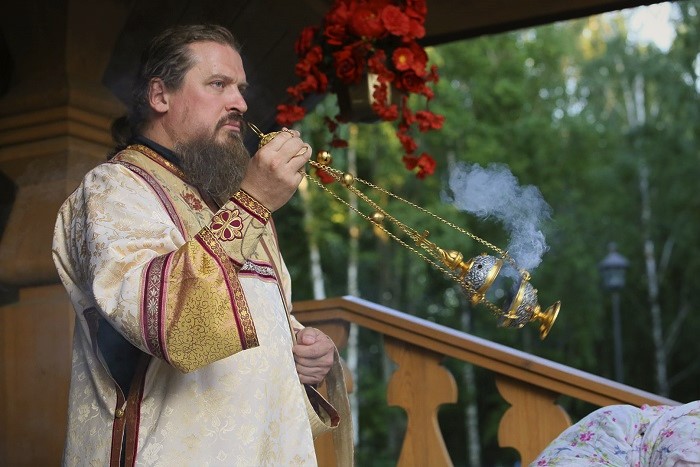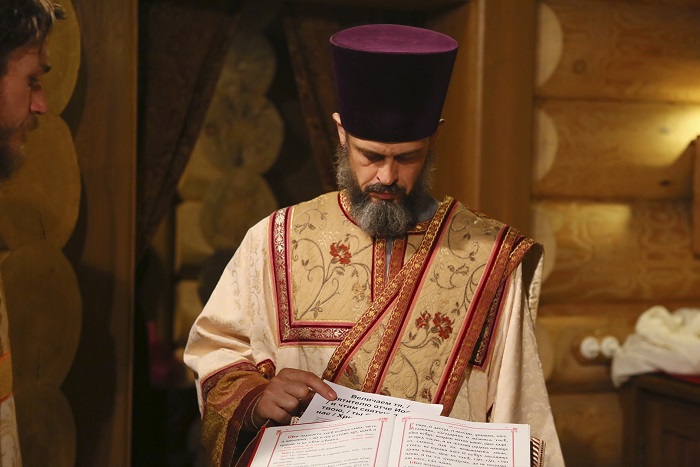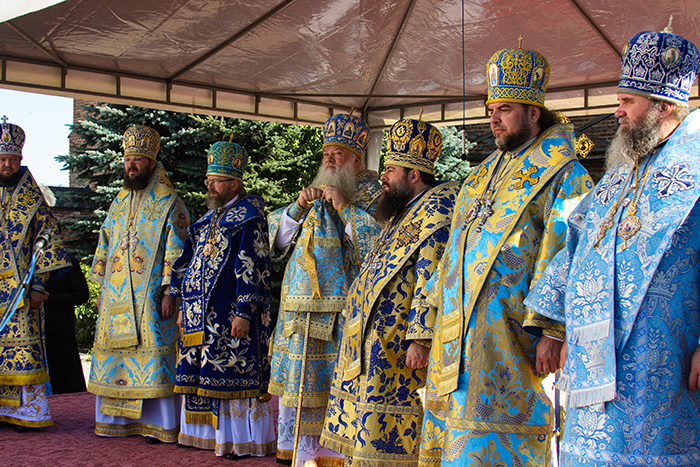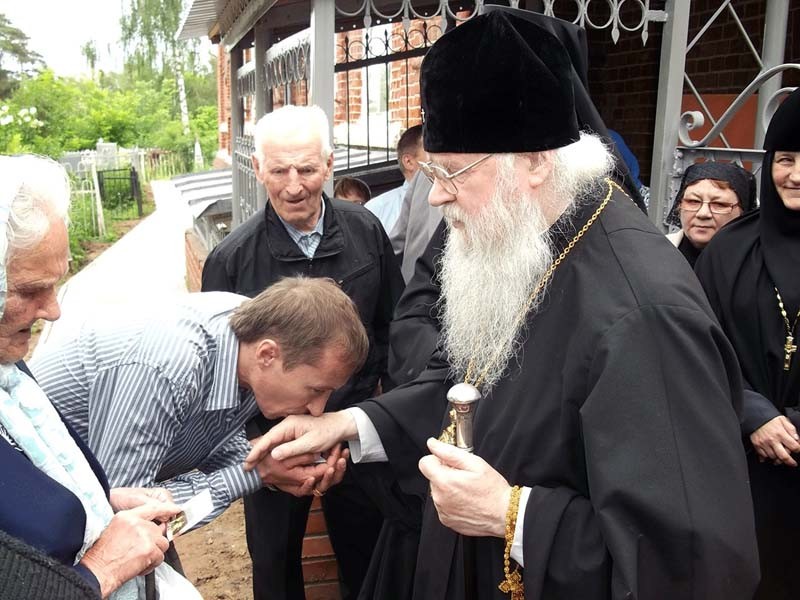
One of the many blessings I enjoy in my present assignment (St. Michael the Archangel Ukrainian Orthodox Church in Woonsocket, RI) is that I have three deacons serving with me. It’s the sign of the health of our parish that we have grown three diaconal vocations within our parish over the last few years (note that one moved and serves elsewhere while one of our serving deacons moved here from elsewhere). Our deacons are more than liturgical con-celebabrants; each has his own gifts and ministries. I love supporting them and seeing God’s grace spread through their ministry.
I have talked with many deacons and priests about the diaconate and have attempted to distill their words of wisdom into these two sets of advice for new deacons. I encourage everyone to add their own advice in the comments section below!Alas, not everyone’s experiences with deacons are so positive and most priests and deacons have a fair share of first and second-hand horror stories about diaconal service gone wrong.
Seven things that allow the deacon to be a blessing:
1) Kenosis; Surrender your life to God (through Christ) and Holy Orthodoxy. The Word did not consider Himself so good that He wouldn’t empty Himself for our salvation; St. Paul imitated Christ by becoming what people needed so that some might be saved. It’s not about you – it’s about loving and serving God and His people. No matter how good your voice and vestments are, its all just noise if you don’t get this part right.

2) Know the Services Cold (but know the ustav/preferred practices of your bishop, priest, and parish, too). Memorize the services and all its variations; mark all your books so that you’ll do the right thing even when your mind goes blank (it will). Communicate with your priest before and after the service to make sure you both get and stay on the same page. Defer to your priest and bishop on the services (and parish life) even when you disagree or your favorite book says something different.
3) Love, Serve, and Support Your Priest. A big part of your calling is supporting your priest. Like a good First Sergeant, you should use your expertise to implement his plan for parish life and evangelization. His approach may be different that yours would be; you can and should give advice, but support him in his decisions and approach … especially in public. Every priest needs someone he can trust to guard his six.
4) Serve, Serve, Serve, but Always Get a Blessing. From the time of its establishment, the diaconate has had its own role within the community; later, it developed its own liturgical role. Continually grow within those roles and live up to your calling. Your priest should help you with this. Remember that deacons are not independent operators; every deacon is assigned to serve directly under a specific priest (or bishop). Stay in regular contact with your priest about what you are doing and how it is going. Get his blessing for each task. You do this during the Liturgy; Liturgy is life.
5) Stay Grounded and Balanced. The demands of kenosis and diaconal service do not abrogate your other responsibilities, including the responsibility to keep yourself physically, mentally, and spiritually grounded. Make sure that your service is sustainable. Again, communicate with your priest so that he does not expect too much (or too little) of your time. Daily prayer and frequent confession are critical!

Seven warnings to deacons:
1) Don’t embarrass your priest, your bishop, your parish, or the Church. The most obvious example of this is making mistakes during services, but these are more easily overcome than others. Social media sets many clergy up for failure – be careful! When you do make a mistake, be quick to ask for forgiveness and help with damage control.
2) Don’t act like you are still a lay leader of the parish. Lay leaders often have pet agendas that differ from those of their priest; that is part of parish life. One of the huge temptations of parish life is factionalism; the deacon must join the priest in being above and moderating factions. He should never set up his own faction, lobby, or gossip against his priest (even when his priest is messing up). If you have a problem with your priest, talk to him. If that doesn’t work, ask for a blessing to talk to your bishop.
3) Don’t set yourself up as a second father within the parish. You are not going to agree with your priest on everything he does. You may not like the kind of culture he is fostering. If you advertise your disagreement or, worse yet, try to encourage a different kind of culture than your priest, you are going to split the parish. It’s a big temptation and you are sure to find allies who agree with you (or are willing to use you), but it’s a sin. If you can’t learn to support your priest, ask for a blessing to talk with the bishop; he may be willing to assign you somewhere else. Should you become a priest, you can consider fostering a different kind of culture and making different decisions, but see “kenosis” above. The worst example of this behavior is when a deacon manipulates the factions within a parish in hopes of taking the priest’s place.
4) Don’t liturgize off-key. If the choir or chanters seem to stumble when you are liturgizing, odds are that that you are confusing them by singing off-key. This isn’t just hard on choirs and chanters, it is distracting to people who are trying to worship and pray. Just because you have a beautiful bass-proffundo voice doesn’t mean you can just sing whatever notes you want. When in doubt, stick to the tonic or the fifth. Similarly, you aren’t at the opera or at karaoke; stay within or close to the style of the choir/parish.
5) Don’t fall victim to vainglory, apathy, or despondency. You serve at the altar and are a leader of the community and of the Church. This makes you a huge target for the Evil One and his servants. Be vigilant, pray, fast, live a life in the Sacraments, tithe, study scripture and the Fathers, keep yourself healthy, and do all those things you advise your priest to do so that he can remain effective in his ministry.




Thank you for these tips, Dn Steven
And, let us show, evidence, and support respect for, thankfulness for, and appreciation for the sacrifices of, the efforts of, and the selfless giving of the Deacons in the Orthodox Church.
As we Orthodox all know, when a Bishop (Metropolitan, or Patriarch) is celebrating the Divine Liturgy or any service, the Priest’s role is minimal (since the priest’s role is to represent the bishop when the bishop is not present).
However, the Deacon has an essential, significant, confirmed-by-Orthodox-Tradition role in any service when/where a bishop is present and celebrating.
In the earliest times/tradition of The Orthodox Church, there were Bishops and Deacons – Priests came later. as representatives of the Bishop.
thank you for these beautiful reminders it’s human nature to take many things for granted, these reminders are helpful in keeping our perspective on “the One Thing Needful”! deacon gavrilo
This is excellent! I am a candidate for ordination to the diaconate and this is terrific guidance and all things I have been taught to put into practice serving as a Subdeacon. Regarding some advice on those who struggle with vocalizing in tune. I would add that if you are having trouble matching pitch with your choir/chanters there are ways to improve one’s ability to do so. Now for those who have amusia (I.e. tone deafness) there is no known cure because it is a cognitive disorder. The inability to match pitch falls on a spectrum and there can be several causes, but even with extreme cases there are techniques that can aid in improving one’s ability to match pitch. The following link will take you to an excellent article on this topic-
https://www.singwise.com/articles/tone-deafness-amusia-and-other-causes-of-persistent-pitch-problems
In addition I would involve your Protopsaltis and/or choir director in your efforts to improve. I know one deacon who can’t carry a tune in a bucket, but he is able to stay on pitch with himself and the choir is able to work around him as he has learned to pitch his litanies in the middle range of his voice.
May God richly bless all who serve in the beautiful ministry of the diaconate. ☦️☦️☦️ Sdn. John